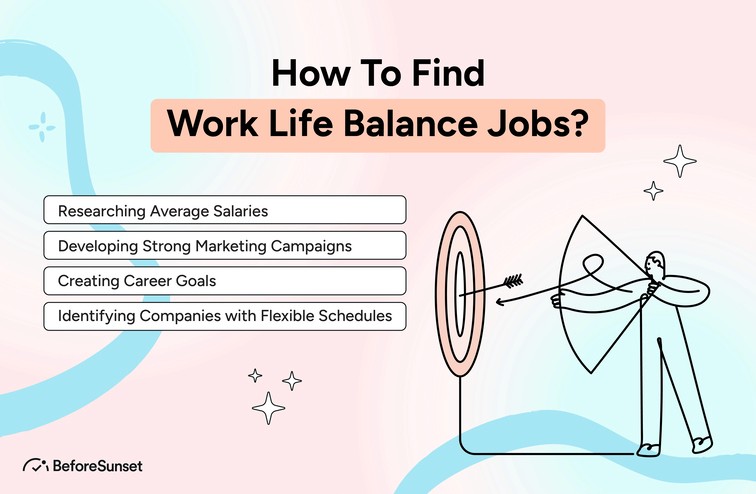The desire to achieve professional success while simultaneously fostering a satisfying personal life has resulted in an increase in demand for occupations that support this balance. But the issue remains: How can you locate these elusive work-life balance positions that not only provide financial security but also allow you the opportunity to enjoy life's moments away from the office?

Types of Jobs with Work-Life Balance
Finding this balance between one's personal and professional lives is crucial for maintaining long-term work success as well as for one's own well-being. While setting personal limits and maintaining a work-life balance are important factors, the nature of one's employment may have a big influence on this equilibrium.
Some professions naturally provide more flexibility and possibilities for balance, enabling people to flourish in their work while still leading meaningful personal lives.
Remote Worker
Recent years have seen a substantial increase in the popularity of remote employees, who provide a special way to achieve work-life balance. These experts use technology to carry out their tasks from the convenience of their homes or other distant locations.
Jobs in this category, which offer flexibility in terms of working hours and location, include those that include writing content, developing software, digital marketing, and data analysis. People who work remotely may adjust their schedules to accommodate personal obligations, which cuts down on commute time and opens up more time for family, hobbies, and self-care.
Although remote work necessitates self-control and efficient time management, it grants the freedom to design a workplace that suits a person's tastes, promoting a more harmonious and rewarding work-life integration.
Real Estate Agent
Due to the inherent flexibility in their line of work, real estate brokers frequently experience some degree of work-life balance. Although their schedules might be hectic at busy times, they have the freedom to use their time wisely.
When showing homes, negotiating transactions, and interacting with customers, real estate agents can decide where and when to do so. They are able to fulfill personal commitments like family gatherings or recreational activities because of their flexibility.
Real estate brokers may now operate remotely more easily thanks to technological developments, which improves their work-life balance even more. While the job requires commitment and responsiveness, it also has the ability to lead to a balanced existence, making it a desirable option for people looking for a career that gives some autonomy and balance.

Market Trends for High-Paying Jobs with Work-Life Balance
Tech-Driven Roles: Positions in the technology sector, such as those in software development, data science, and cybersecurity, are in great demand and pay well. Many IT businesses place a high priority on work-life balance, giving employees advantages like flexible scheduling and long vacations.
Healthcare Professions: Compared to conventional physician jobs, other healthcare occupations, such as nurse practitioners and physician assistants, provide significant income potential while allowing for some degree of work-life balance. Healthcare firms are becoming more aware of how critical it is to reduce employee burnout.
Consulting and Management Roles: Project managers and management consultants frequently earn high incomes and have flexible work schedules. To retain top personnel, corporations and consulting firms are placing more value on work-life balance.
Entrepreneurship and Startups: Although entrepreneurship might be challenging, it offers the possibility of high income and schedule flexibility. Work-life balance is frequently emphasized by startups as a way to draw in and keep top personnel in cutthroat marketplaces.
Financial Services: Positions in the financial sector that are well-paid and allow for work-life balance include those of financial analysts and advisers. Employers place a strong emphasis on employee happiness to increase retention.
Education and Academia: University professors and other educators may have the freedom to juggle work and play. Particularly for people with advanced degrees, this area may offer significant pay.
Energy and Environmental Sectors: Jobs in the energy and environmental sectors are growing increasingly profitable and may provide a feeling of purpose in addition to a work-life balance.
Government & Public Service: Certain government jobs, especially those at the federal or state levels, can offer competitive compensation and work-life balance through set hours and significant benefits.
Legal Professions: Compared to employment at law firms, some legal occupations, such as in-house counsel for businesses or government attorneys, provide significant salaries along with more stable and well-balanced work schedules.
Finding a Job with a Good Work-Life Balance
The conventional approach of working nonstop to advance up the business ladder while sacrificing personal time is no longer the sole route to success. People nowadays are looking for employment that will allow them to follow their particular interests, keep a healthy lifestyle, and enjoy financial security and professional advancement prospects.
Researching Average Salaries and Wide Range of Options
Many people who want to mix a successful profession with a meaningful personal life want to find a position that allows for a healthy work-life balance. It's important to examine not just the average salary but the vast range of possibilities available in order to make an educated decision about the sort of employment that offers the proper balance for you.
Establish your priorities both personally and professionally to start. What do you consider to be the most crucial elements of work-life balance? Is it remote work possibilities, flexible work hours, or a cap on overtime? Your employment search will be guided by your priorities.
Industry research reveals that standards for work-life balance differ by sector. For instance, flexible work schedules are common in the technology industry, but lengthy and irregular hours may be required in some healthcare roles. Investigate sectors that fit your goals and interests.
Within each industry, certain job positions may differ in terms of how they balance work and life. For instance, in the computer sector, software engineers frequently have greater control over their schedules than IT support personnel. Look into the particular positions that interest you and learn about the usual working conditions and requirements.
Investigate the typical pay rates for the positions you are considering. Salary information for different professions may be found on websites like Glassdoor, Payscale, and the Bureau of Labor Statistics (for U.S. occupations). Remember that wages might differ depending on things like geography, experience, and education.
Work-life balance is significantly influenced by company culture. Learn about the attitudes and policies of possible employers in relation to work-life balance by doing research on them. To learn more about the corporate culture, read employee testimonials and, if you can, get in touch with current or former staff members.
By attending networking events, using social media sites like LinkedIn, and joining professional groups, you may make connections with people who work in the business or field you're interested in. They could even give career leads and offer insightful information on work-life balance in their particular business.
Finding work-life balance might occasionally need taking unusual professional routes. Think about scheduling options like consulting, freelancing, or starting your own business. Although the income levels of these alternatives may differ, they can offer a more balanced living.

Identifying Companies with Flexible Schedules and Hours
In order to locate a career that promotes a healthy work-life balance, it is essential to identify organizations with flexible schedules and hours. Such businesses place a high value on meeting the requirements of their staff members and understanding the importance of a healthy work-life balance on productivity and job happiness.
Conducting internet research is a good way to start your quest. Companies' work cultures, especially whether they provide flexible schedules, are frequently revealed on websites like Glassdoor, Indeed, and LinkedIn. Look for testimonials and remarks from real or past customers that discuss flexibility in schedule and work-life balance.
Visit the official websites of the companies in which you are interested. Today, a lot of businesses emphasize their dedication to work-life balance as part of their employer branding. Look for paragraphs or pages that address the culture, working conditions, and employee perks.
If at all feasible, get in touch with current or past workers of the businesses you're considering. They may offer personal knowledge of the organization's rules and procedures regarding flexible work schedules and hours. It might be helpful to network on websites like LinkedIn to meet people who work for your desired business.
Pay close attention to job postings. In their job advertising, several businesses specifically emphasize flexible work schedules, remote work alternatives, or alternative work arrangements. This demonstrates a company's dedication to work-life harmony.
Examine the corporate ratings and awards for any that mention work-life balance. Companies that place a high priority on this component of employee well-being frequently win awards or recognition from trade magazines like "Best Places to Work." These honors might be a reliable sign of a company's attitude toward work-life balance.
Don't be afraid to inquire about the company's policy on flexibility and working hours during job interviews. Ask them about their policies on overtime, whether they provide remote work choices, and whether they have any other schedule options available, such as shortened workweeks or flexible start and finish hours.
Developing Strong Marketing Campaigns to Reach Job Seekers
Many job searchers prioritize finding a position that allows for a healthy work-life balance; as a result, it is essential for businesses and organizations seeking to recruit top talent to create effective marketing efforts to reach them.
Understanding the target audience is the first step in developing a successful marketing campaign. Work-life balance is one of the top goals for job searchers. Conduct market research to determine the characteristics, passions, and goals of this particular group. Are they parents seeking flexible work schedules? Are they experts looking for remote employment opportunities? Make sure your messaging speaks to their requirements.
The advantages your company offers for work-life balance should be made clear. Promote work-life balance by highlighting flexible scheduling, remote work possibilities, generous vacation policies, and any other benefits. To illustrate how these advantages boost employees' quality of life, use captivating language and images.
To reach job searchers, make use of online resources like your company website, social media, and job boards. Create interesting material that highlights your company's dedication to work-life balance, such as blog entries, videos, and infographics. Share success stories and staff testimonies to show the good effects in practice.
Establish a powerful employer brand that demonstrates your dedication to work-life harmony. Make sure that this message is in line with the mission and values of your company. Building confidence and trust requires consistency in branding across all touchpoints, including your website and social media accounts.
Motivate your present staff to speak up for your company. They can recommend possible applicants, join online forums, and post their experiences on social media. Genuine endorsements from your team members are highly valued by potential employees.
Engage in thought leadership to position your company as an authority on work-life balance. Publish studies, whitepapers, and articles to show your authority on the subject. Job searchers who prioritize work-life balance and esteem your expertise in this field may be drawn to this information.
To meet potential employees in person, go to Job Fairs, Career Expos, and Industry Events. Utilize these chances to talk about your company's dedication to work-life balance and to advertise any job openings that may exist.
Keep an eye on how your marketing strategies are doing. Utilize analytics software to monitor visitor traffic to your website, social media activity, and the amount of job applications. Based on the facts, modify your campaign strategy to increase your reach and effect.

Creating Career Goals and Paths for Balanced Careers
A strategic strategy that can result in improved job satisfaction and general well-being is developing career objectives and routes that place a priority on a balanced work-life.
Think about your own values and priorities first. What exactly do you mean by "work-life balance"? Is it having more flexibility in your schedule, spending more time with your family, or engaging in hobbies? You may make objectives that are meaningful if you know what is actually important to you.
Establish your short- and long-term professional goals. Identify your goals for the next five, 10, or twenty years. Your beliefs and priorities for a work-life balance should be reflected in these objectives. For instance, if spending time with your kids is important to you, one of your goals may be to land a job that allows you to work from home or with flexible hours.
Look into professions and businesses that naturally promote work-life balance. It's possible that some professions, like teaching, medicine, or software development, provide more flexible work schedules than others. Think about how these sectors fit with your talents and interests.
Make contact with mentors or career counselors who can offer advice. They may give guidance on choosing a job path that promotes work-life balance and assist you in setting reasonable objectives.
The development of skills and ongoing learning are essential for job advancement. Spend money on education, certifications, and training that support your professional objectives. Your value may increase in employment which offers flexibility if you upgrade your abilities.
Don't be afraid to express your goal for work-life balance during compensation discussions and job interviews. Ask for perks like flextime, remote work possibilities, or shorter workweeks during negotiations. Many bosses are amenable to these conversations.
Strategies to Maintain a Healthy Work-Life Balance
It takes conscious effort and strategic planning to achieve this balance, which enables us to excel in our jobs while fostering our well-being outside of work. More and more people are opposing the tendency to relentlessly pursue professional achievement at the price of our personal lives.

Taking Personal Time and Prioritizing Family Time
Forging a healthy work-life balance, it's crucial to prioritize personal time as well as family time. Your ability to recharge, explore interests, and practice self-care during your free time can help your mental and emotional health. It's important to arrange time for leisure activities, such as reading a book, taking a stroll, or engaging in mindfulness.
In a similar vein, making family time a priority strengthens ties and improves personal relationships. Set aside time for loved ones, whether it be through family dinners, trips, or just quality time spent together. With the help of these techniques, you can protect your relationships and general happiness from work-related distractions.
Setting Boundaries Between Home and Work Life
It is essential to set clear boundaries between your personal and professional lives in order to maintain your work-life balance. This entails clearly delineating the boundaries between work obligations and personal obligations. You may prevent work commitments from invading your personal life by defining boundaries for digital use, assigning certain work hours, and setting up a separate workplace.
For your family, coworkers, and superiors to respect your personal time, you must make them aware of your boundaries. By giving you the freedom to focus entirely on work during set hours and, as essential, to unplug and recover during downtime, you can minimize stress and improve your quality of life in general.
Establishing Reasonable Expectations about Working Hours and Commitments
A successful work-life balance depends on setting realistic expectations regarding obligations and working hours. It entails being truthful with both your employer and yourself about what can be accomplished in a typical workday or workweek.
Make sure you and your employer are both aware of your availability restrictions by assertively and clearly communicating your boundaries. You lessen your chance of overextending yourself and going through burnout by setting reasonable expectations.
This strategy promotes productive work during set hours and gives you the freedom to completely unplug during downtime, promoting a better and more enjoyable work-life balance.
No Matter What Your Job Is BeforeSunset is Here To Create That Work-Life Balance
BeforeSunset AI plays a pivotal role in achieving work-life balance by helping individuals streamline their work processes, prioritize tasks, and manage their time more efficiently. Try BeforeSunset AI today!


